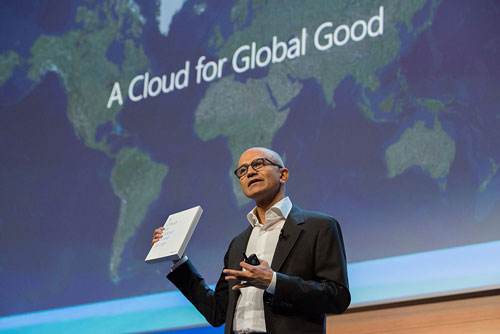Microsoft Seeks To Frame Global Technology Policy Debate
Satya Nadella and Brad Smith kicked off a Microsoft campaign to shape the global debate on technology policy with a joint keynote in Dublin, Ireland, Monday morning and the release of a policy book containing 78 specific recommendations.
At a base level, Microsoft's interest in the global policy debate around the future of the cloud has to do with protecting its multibillion-dollar investment in a public cloud infrastructure and trying to maximize the opportunity for those datacenters to store and serve data and computing power to customers in as many countries as possible.
Nadella made a higher-minded case for the company's involvement in his speech. "With any new technology like the cloud, one of the profound things that happens is change, and rapid change and disruptive change. And so it is incumbent on companies like Microsoft and the broader tech community and governments to have that dialogue where we look at this new technology and ask ourselves the question: 'Is this technology truly going to benefit everyone on the planet? Is this technology that is helping to solve some of the pressing issues, whether they be in education or in health care?'" said Nadella, Microsoft's CEO since 2014, whose main slogan during his tenure has been "cloud-first, mobile-first."
On stage, Nadella held up Microsoft's contribution to that discussion in the form of a book called "A Cloud for Global Good," which Microsoft posted online Monday morning. "That is a concrete step that we are taking to propose a set of ideas, a set of policy considerations, for broader discussion so that we can come up with ways that these disruptive technologies can help global growth in a way that is more trusted, more responsible and more inclusive," he said.
 Microsoft CEO Satya Nadella holding a copy of "A Cloud for Global Good" during Monday's presentation.
Microsoft CEO Satya Nadella holding a copy of "A Cloud for Global Good" during Monday's presentation.
The first chapter of Microsoft's book sets up the positive and negative futures the cloud could enable:
The potential is so vast that some are already calling it the Fourth Industrial Revolution. The benefits could be enormous. It's now possible to imagine a not-too-distant future in which poverty has all but been eliminated, diseases that have plagued mankind for millennia have been eradicated, a solution for climate change has been found, and new forms of communication and collaboration have unleashed creativity and innovation on an epic scale.
But it's also possible to look at the same technological revolution and wonder if we may be headed toward a darker future in which robots and automation drive millions of people out of the workforce, income inequality becomes an unbridgeable chasm, public safety is constantly under siege, and privacy is undermined by intrusive surveillance and the uncontrolled collection of personal information.
Microsoft's recommendations fall into 15 categories: personal privacy, government access to data, cross-border data flows, secure and reliable cloud services, international cybersecurity norms, modern cybercrime prevention, balancing human rights and public safety, technology fraud and online exploitation, environmental sustainability, artificial intelligence, affordable and ubiquitous access, digital literacy, developing next-generation skills, including people with disabilities, and supporting businesses of every size.
Smith, Microsoft's president and chief legal officer, has taken the lead for Microsoft in advocating for cross-border flows of data, for individual rights to data access and for limitations on state surveillance powers.
"It's about ensuring that the kinds of traditional protections that we've all had, not just for years but for centuries, for information that was stored on paper, actually persists for information that is stored in the cloud," Smith said during his keynote.
Also on Monday, Microsoft announced that it had spent $3 billion in Europe alone on its public cloud datacenter buildout and that it would be opening datacenters in France in 2017.
Posted by Scott Bekker on October 03, 2016